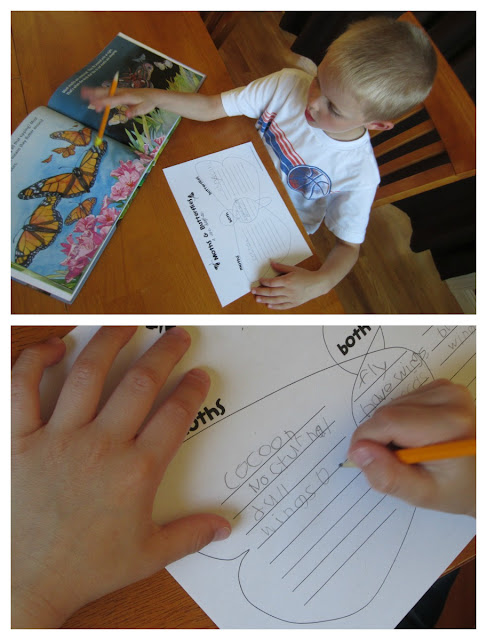Just last week, my son spotted a winged insect flitting
across our lawn. “Look, Mom, a butterfly!” he announced. “Actually, I think it’s
a moth,” I said. He looked at me with his eyes all filled with mystery and
said, “How do you know?” Hmmmm … how DID
I know?
Luckily, our library had the answer. I checked out What’s the Difference Between a Butterfly
and a Moth? written by Robin Michal Koontz and illustrated by
Bandelin-Dacey.
This wasn’t the first time we’d checked out one of the books in this “What’s the Difference…?” series (check out our frogs and toads activity), so our expectations were high. We weren’t disappointed.
This wasn’t the first time we’d checked out one of the books in this “What’s the Difference…?” series (check out our frogs and toads activity), so our expectations were high. We weren’t disappointed.
The book provides a concise comparison of butterflies and moths, highlighting both their similarities and differences. We learned a ton and both oogled over the breathtaking painted illustrations in the book. Even my youngest son (a toddler) pointed and exclaimed, “Look it!” every time we turned a page.
When we were done reading, I gave my oldest son a venn
diagram and pencil. I’m not going to lie. After two weeks of no school,
igniting the ambition to write was a bit of a challenge.
 |
| Download a PDF of the moths and butterflies venn diagram I made here. |
The good news, though, is that he remembered much of what we’d
read and could fill most of it out from memory, only needing to refer to the
book for spelling terms like diurnal (awake
and active during the day) and nocturnal
(awake and active at night).
Under “both” in the diagram, he wrote “fly, have wings and proboscis.” In each of the wings he recorded the different
types of casings they form before transforming from a caterpillar (i.e.
butterflies make a chrysalis, moths make a cocoon), their different coloring,
when they are active, and the position of their wings when they land.
We both loved learning about these amazing creatures. Next
time someone asks my son what the difference is, he can refer back to his venn
diagram ... and I can too!




Love your ideas...thanks so much for sharing them. You are so very creative with your little boy.
ReplyDeleteExcellent way to create a learning moment! I'll have to look for that book series - thanks for sharing.
ReplyDeleteWhat a wonderful way to harness a learning opportunity. The book looks lovely too. Thank you for linking up to our Keeping it Real: non-fiction reading adventure :-)
ReplyDeleteCute idea! Thanks for sharing the PDF. I'm saving it for when I'm doing a butterfly unit for my daughters Kindergarten year.
ReplyDeleteHow fun! I think I need to look for those books. :-)
ReplyDeleteThanks for linking to my Super Link Party! :-)
What a cute Venn! What a great way to share what they have learned. I love it.
ReplyDeleteThank you for linking to Read.Explore.Learn.
This is great! I haven't seen those books but we are heading to the library on Friday. I'll have to see if ours has them. Thanks for sharing at our Pinteresting Party.
ReplyDeleteWhat a great lesson! We will definitely be checking out that book. Thanks for sharing at Sharing Saturday!
ReplyDeleteHi! Stopping by to let you know that I featured your venn diagram at the Sunday Showcase (there are 5 new co-hosts!)! Hope to see you again this week! Thanks for sharing!
ReplyDeleteThat printable is way too cute! Thanks for sharing on Science Sunday!
ReplyDelete